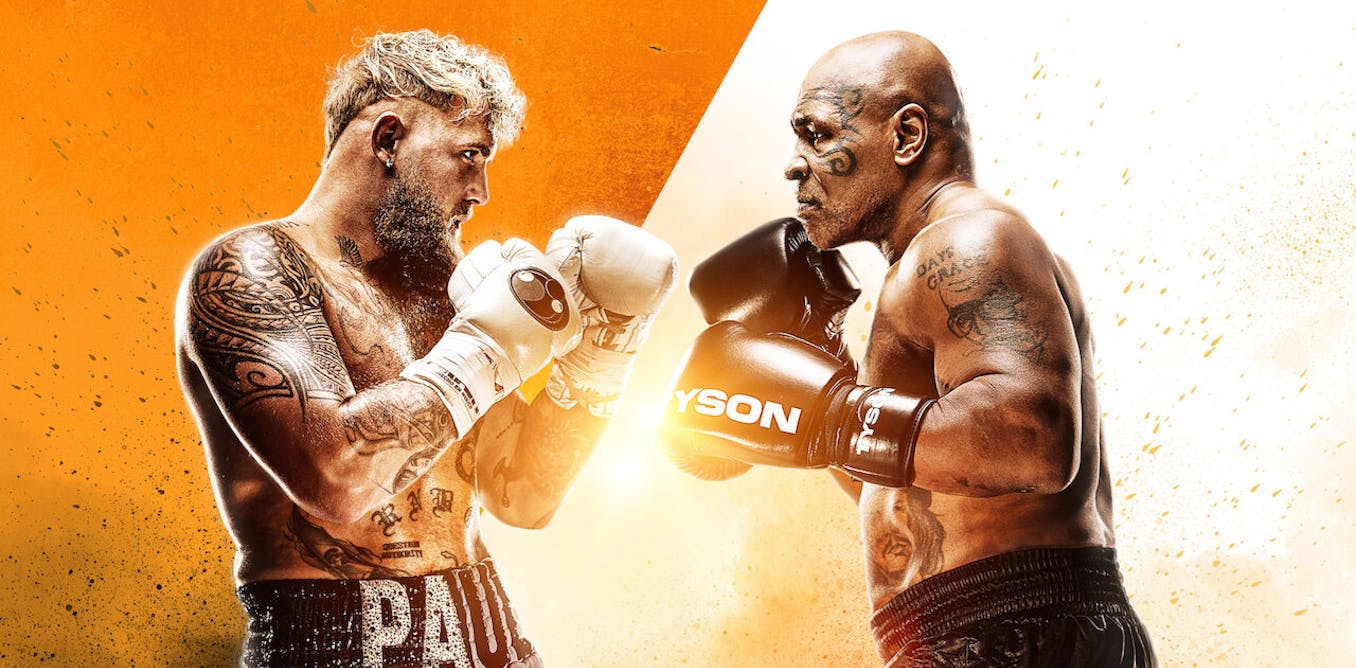Alongside this trend, there is a growing pursuit of spectacle and profit from events supposedly marketed as sports. High-profile examples include last year’s Netflix-produced boxing match between influencer Jake Paul and boxing legend Mike Tyson, and the Enhanced Games, also known as the “doping-legal Olympics”.
Events like these blur the line between entertainment and sport. They run the risk of compromising the values that underpin competitive sport, and put participants’ safety at risk.
The Paul-Tyson boxing match was one of the year’s biggest “sports” events with over 108 million viewers, while the Enhanced Games is still at the planning stage. Proposed by Australian billionaire Dr Aron D’Souza in August 2023 as an alternative to the “corrupt and dysfunctional” world of the Olympics, it has already gathered financial momentum thanks to investments from US billionaire and PayPal founder Peter Thiel, among others.
At these events, money is king. Though official figures were not published, Paul and Tyson were allegedly paid tens of millions for their bout, while $1 million awaits those who break the 50 and 100 metre freestyle swimming records at the Enhanced Games. At least one former swimming world champion has already agreed to come out of retirement to compete.
The Enhanced Games are not a particularly original idea. They plan to put into practice a certain version of “doping under medical supervision” which has been advocated by several philosophers over the years. Proponents claim that by allowing athletes to take performance enhancing drugs, they will promote values of honesty and transparency, and create a safe environment for the athletes.
Challenging sport’s core values
One prominent critic has said anyone would be “moronic” to sign up for the Enhanced Games, but roundly dismissing them means ignoring their evidently strong public appeal. Instead, we should look more closely at the values underpinning sports. According to philosopher Alasdair MacIntyre these can be broken down into two categories: internal and external values.
Sport’s internal values are the excellences inherent to a particular type of sport as well as values such as fairness, physical excellence, adherence to regulations, and honesty. These are are broadly captured in the World Anti-Doping Agency (WADA)‘s “spirit of sport” criteria.
External values are linked to validation from outside sources. This can include breaking world records, fame, prize money, sponsorships, and so on.
Sport’s appeal lies in the combination of these two sets of values. However, events like the Paul vs. Tyson match and the Enhanced Games prioritise external values at the expense of internal ones.
Putting entertainment over safety
These events not only threaten sport’s internal values, but also pose serious risks to participants’ safety.
Disclosing doping could, as the Enhanced Games’ promoters argue, foster honesty, transparency, and reduce corruption. However, allowing performance-enhancing drugs is undeniably dangerous, and a permissive attitude raises significant concerns about health risks, harmful combinations of performance-enhancing drugs, and negative spillover effects on young people and society as a whole.
Moreover, as long as financial incentives are at play, there will be incentives for athletes to “take and hide”, meaning they take some substances secretively. This would defy the very ethos of the Enhanced Games, and put athletes’ health at risk.
Safety concerns are not, of course, limited to the Enhanced Games. Despite adjustments – such as using 14-ounce gloves instead of 10-ounce ones to reduce impact – the Paul vs. Tyson match had significant risk factors, not least Tyson’s age (58), recent health issues, and the absence of protective gear.
Balancing entertainment and values
We are left with a conundrum. Events such as these have an evidently very wide public appeal, but they also pose significant health risks to their participants, and potentially impact the internal rules of the sports themselves, which are bent to enhance entertainment.
So should we, as a society allow these events to take place?
We believe that regulation is preferable to an outright ban, as with no regulatory oversight, safety standards remain unaddressed. Unlimited earnings and prize money can also influence participants’ ability to make autonomous choices, and encourages them to overlook health priorities.
We also argue that events such as the Paul-Tyson match should be clearly labelled as “not sport”, putting clear distance between these events and the sports they are inspired by.
The Enhanced Games, for their part, should be taken seriously as a challenge to current anti-doping policies. They reflect a widespread attitude of discontent where the public sees athletes as the sole culprits in doping scandals.
We have argued elsewhere for the need to extend the liability of doping beyond the athlete to other key members of their entourage, including coaches. The new WADA Code, currently being drafted and due to come into effect in January 2027, should take this into account.
Ultimately, over time, it is unavoidable that sports will evolve, gaining different meanings as societies also change. However, we can try to influence their evolution by reducing the incentives for doping in sports, and making other internal values, such as skill and creativity, more central to athletic performance.
This article written by Giulia Sesa, PhD Candidate in Biomedical Sciences (KU Leuven) & PhD Candidate in Sport Sciences (Norwegian School of Sport Sciences), KU Leuven and is republished from The Conversation under a Creative Commons license. Read the original article.
Discover more from Future of Society
Subscribe to get the latest posts sent to your email.





